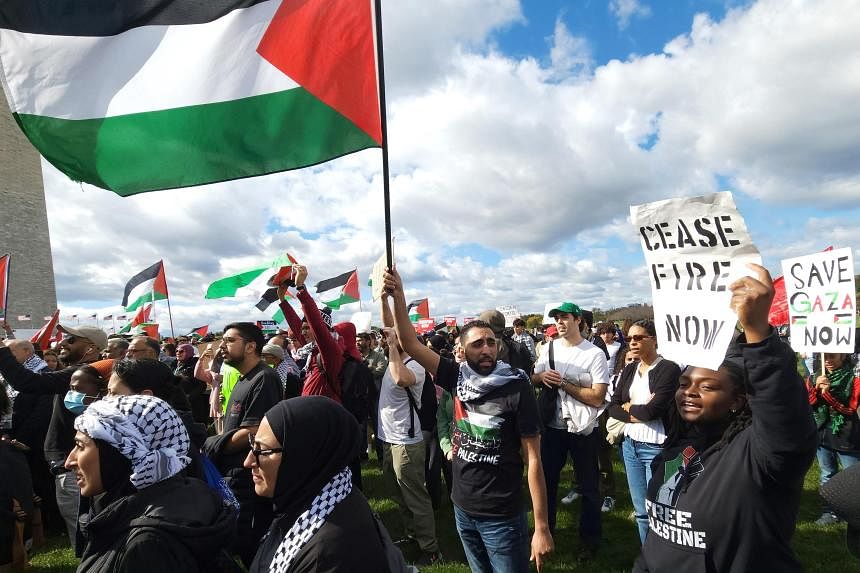WASHINGTON – Her voice firm yet shaking with emotion, Palestinian-American school principal Maysoon Awad, 54, could barely contain her anger.
“America is supporting Israel, and that’s what makes us mad as American citizens,” she told The Straits Times.
“We know that America always says it seeks justice, but we don’t see any justice in this,” she said, as friends around her unfurled a Palestinian flag.
Ms Awad was among several hundred protesters at the Washington Monument on Saturday demanding a ceasefire in the ongoing war between Israel and Hamas. Alongside her was a friend, Ms Ayesha Kuhil, 72, who said she had family in Gaza and had not heard from them for three days.
Many in the Palestinian diaspora in the United States are deeply conflicted. The war is being broadcast in real time on the Internet – amped up and often distorted by propaganda and disinformation.
That has spilled over into the US, where Palestinian Americans and, more broadly, Arab Americans and Muslims, now face a new wave of Islamophobia.
Reports of Islamophobic language or incidents have come from across the country. Much of them are being fanned by right-wing politicians and media.
In its review of instances of Islamophobia, the journal HuffPost cited Mr Eric Bolling, a host at the conservative cable news company Newsmax, as saying that Palestinians are “addicted to violence” like an “addict is addicted to drugs”.
Mr Dan Gainor, a freelance opinion editor at Fox News, in a post on X, formerly known as Twitter, called Palestinians and Arabs “barbarian pigs”.
Others have attacked Muslim legislators. Somali American Minnesota congresswoman Ilhan Omar, one of only two Muslim women in Congress – the other is Ms Rashida Tlaib of Michigan, the lone Palestinian in Congress – has been receiving death threats over the phone.
Mr Charles Kirk, president of the right-wing organisation Turning Point USA, which has promoted Christian nationalism, referred to Ms Omar as “an active threat to the United States”.
Ms Tlaib has been called a “terrorist sympathiser” by Republican congresswoman and Donald Trump ally Marjorie Taylor Greene.
The war has reverberated through university campuses as well, filling social media feeds with scenes of outrage.
In one case, an elite law firm reportedly revoked job offers to three Ivy League students from the universities of Harvard and Columbia who had signed a letter expressing support for Palestinians that blamed Israel for the Hamas attacks.
Anti-Semitism, not far below the surface in the country, has also risen on the back of the war in the Middle East. Much of this, wrote Jewish writer Michael Cohen, a fellow with the Eurasia Group Foundation, in an Oct 21 column for MSNBC, is an “age-old anti-semitic trope that Jews are responsible for their own suffering”.
Former journalist and author Sanford J. Ungar, director of the Free Speech Project at Georgetown University, in an e-mail to ST, said: “On college and university campuses... nearly everyone has by now taken a side in the seemingly endless, symbolic Middle East struggle, and the feelings run very high; nuances have been dropped.
“Professors are being scrutinised in the classroom for alleged bias, and volatile accusations are being exchanged among students.”
The best that university administrators can hope for, he added, is to get deeply polarised groups together for civil conversation about their differences.
Ms Rania Mustafa, New Jersey-based executive director at the non-profit Palestinian American Community Centre, noted “a really deep fear running in our community”.
The centre advocates for the cause of Palestine, and supports and counsels the Palestinian community, among other activities.
Palestinians are struggling to humanise themselves against the trope of radical Islamic militant groups, she told ST. The broader Arab and Muslim community is being stained as well, she said.
“These tropes are hurting (the communities) and taking away from what I think is the root cause of all of this, the Israeli occupation of Palestine. It’s kind of flipping the script, painting the oppressor as the victim, rather than as the oppressor. It’s a difficult time for all Palestinians.”
She added: “Americans that identify as Muslim, Palestinian or Arab are getting the brunt of it and people don’t understand some of the nuances or don’t understand the context or the history.
“They’re just seeing that there’s this evil thing that’s out there that’s coming out of Islamic radicalism, and are painting a huge group of people to be part of that – and we are the ones who are paying the price.”
Palestinian Americans number around 200,000 to 400,000 – part of a 3.7 million-strong Arab American population. New Jersey has one of the largest Palestinian populations in the country.
The current crisis comes just as US public opinion has become “modestly more positive towards both sides in the Israel-Palestinian conflict”, according to a 2022 Pew Research Centre survey.
Overall, Americans continued to express more positive feelings towards Israelis than towards Palestinians – and to rate the Israeli government more favourably than the Palestinian government, Pew found.
But there was a difference between older and younger people. Adults under 30 viewed Palestinians at least as warmly (61 per cent very or somewhat favourable) as Israelis (56 per cent), Pew found.
“There’s a lot of invigorated pro-Palestinian solidarity in the US, not just from the Palestinian American diaspora, but from allies across the spectrum,” said Mr Tariq Kenney-Shawa, a New York-based US Policy Fellow at a Palestinian policy think tank called Al-Shabaka.
“But there’s this reinvigorated hatred that I believe has roots back in the post 9/11 years and that led up to the (2003) Iraq – and these two strands are definitely clashing,” he noted.
“We have people showing their faces and proudly saying, kill all Palestinians. And nothing, nothing is happening to them.”


